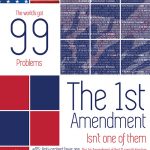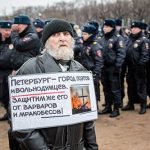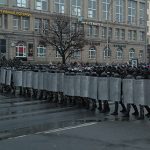This statement was issued by the Special Rapporteur on human rights defenders of the African Commission on Human and Peoples’ Rights and the Special Rapporteurs of the United Nations present at the seminar “Human Rights Defenders and Peaceful Protests” held in Oslo on June 6-8, 2012:
Basic principles
1. States should guarantee the rights to freedom of peaceful assembly, freedom of association, and freedom of opinion and expression, which are essential components of democracy and indispensable to the full enjoyment of civil, political, economic, social and cultural rights.
2. States should take all necessary measures to protect human rights during peaceful protests and to ensure that no-one is criminalized or subjected to any threats or acts of violence, harassment, persecution, intimidation or reprisals for addressing human rights issues through peaceful protest or reporting on human rights violations and abuses committed in the context of peaceful protests.
3. States should ensure that their legislation and procedures related to peaceful assembly are in conformity with the spirit and the letter of international human rights law, notably the Universal Declaration of Human Rights (UDHR), the International Covenant on Civil and Political Rights (ICCPR), the International Covenant on Economic, Social and Cultural Rights (ICESCR), the International Convention on the Elimination of All Forms of Racial Discrimination (CERD), the Convention on the Elimination of All Forms of Discrimination against Women (CEDAW), as well as the Declaration on the Right and Responsibility of Individuals, Groups and Organs of Society to Promote and Protect Universally Recognized Human Rights and Fundamental Freedoms (“the Declaration on Human Rights Defenders”), and Human Rights Council resolution 15/21, as well as other relevant international and regional human rights instruments.
4. States should refrain from imposing any undue restrictions on the ability of individuals to freely exchange and ideas on the Internet to organize and mobilize peaceful protests through various platforms, including social networking websites. As stipulated in Human Rights Council resolution 12/16, it is incompatible with international human rights law to impose restrictions on discussion of Government policies and public debate; reporting on human rights, Government activities and corruption in Government; engaging in election campaigns, peaceful demonstrations or political activities, including for peace or democracy; and expression of opinion and dissent, religion or belief, including by persons belonging to minorities or vulnerable groups.
5. Freedom to hold and participate in peaceful assemblies is to be considered the rule; and limitations as the exception. States can place restrictions on the right to freedom of peaceful assembly under exceptional circumstances; only restrictions that are prescribed by law, proportionate to the aim pursued, and necessary in a democratic society in the interests of national security or public order, the protection of public health or morals or the protection of the rights and freedoms of others shall be authorized. Any restrictions should be subject to an independent, impartial and prompt judicial review.
Procedural requirements
6. States should do their utmost to favour regimes of notification rather than authorization. In cases where authorization is required for the holding of an assembly, States are urged to ensure that authorization is given in accordance with the principle of non-discrimination enshrined in the UDHR and the ICCPR. In line with the same principle, States should facilitate the participation of youth and students in peaceful protests, including by removing prohibitions that prevent them from participating.
Enabling environment
7. States should provide support to the efforts exerted by human rights defenders to effectively and efficiently mobilize, organize and monitor peaceful protests. This includes, inter alia, public recognition of the prominent and constructive role of human rights defenders in peaceful protests; and access to unconditional and safe medical assistance for victims of violations during protests. Human rights defenders, operating individually or as part of an association, should be able to access funding local and international sources for their work.
Protection strategies
8. The protection of human rights defenders is greatly dependent on the structures and networks of support that defenders create collectively at the national, regional and international levels. Human rights defenders’ coalitions, national, regional and international networks for communication of information, monitoring groups and support groups that could provide a safe haven should be promoted and strengthened, as these can provide protection for human rights defenders who engage in peaceful protests.
Accountability
9. States should enforce a code of conduct on law enforcement officials, particularly with regard to crowd control and the use of force, and ensure that the legal framework contains effective and non-discriminatory provisions for the oversight and accountability of officials, especially with regard to their responses to public demonstrations and displays of dissent. Any reported excessive use of force or other human rights violations in the context of peaceful protests should be investigated and prosecuted in a prompt, impartial, and independent manner in order to hold perpetrators to account.
10. States should take adequate measures to hold accountable officials and authorities taking unlawful decisions banning peaceful protests. States should ensure the protection of participants before, during and after peaceful protests from acts of violence and intolerance by counter-protestors. States should pay particular attention to the risks faced by marginalized groups and defenders most exposed to attacks and violations, including women human rights defenders, lesbian, gay, bisexual, transgender and intersex people, members of minority and indigenous groups, youth groups, and defenders working to promote economic, social and cultural rights, during peaceful protests.
11. States should also guarantee the protection of women human rights defenders and female journalists, who often face risks when participating in or monitoring collective public action because of perceptions of the traditional role of women in some societies. Instances of gender-based violence occurring during demonstrations should be investigated and prosecuted as a matter of priority.
Independent monitoring of peaceful protests
12. States must ensure that anyone monitoring and reporting on protests, including journalists, community media workers and other media professionals and bloggers do so without fear of intimidation, legal and physical harassment and violence. This includes granting national and foreign media access to public assemblies to facilitate independent and diverse coverage. In particular, States should take all necessary measures to ensure their safety and security, and undertake investigations to prosecute perpetrators of violence and attacks against such individuals.
13. National human rights institutions should take an active role in monitoring human rights violations and abuses during peaceful protests, and investigate complaints about alleged human rights violations and abuses brought to their attention in this context. The focal point for human rights defenders, if such an entity exists within the institution, should play a key role in this regard.
Awareness raising
14. Human rights defenders are encouraged to fully explore the “promotional” aspect of human rights in the context of peaceful protests by collecting and disseminating achievements and lessons learned on the implementation of human rights in the context of peaceful protests. Documenting the positive impact of a constructive and peaceful expression, including expression of dissenting or minority views, will help to soften restrictive positions and attitudes on peaceful protests in our societies.
Cooperation among regional and international human rights mechanisms
15. Special Rapporteurs of the United Nations Human Rights Council and Special Rapporteurs of the regional human rights mechanisms should continue to cooperate and share information on the issue of human rights defenders in the context of peaceful protests. Joint action on emerging issues in this regard should be considered on an ongoing basis. To this end, the undersigned Special Rapporteurs would like to applaud Human Rights Council resolution 19/35 by which the Council requests the High Commissioner for Human Rights to prepare a report on effective measures and best practices to ensure the promotion and protection of human rights in the context of peaceful protests. The undersigned mandate holders intend to provide a joint statement to the High Commissioner for Human Rights and the Human Rights Council as part of the development of this report based on information obtained by their respective mandates from Governments, national human rights institutions and civil society.
Reine Alapini-Gansou, Special Rapporteur on human rights defenders, African Commission on Human and Peoples’ Rights
Maina Kiai, Special Rapporteur on the rights to freedom of peaceful assembly and of association,
United Nations Human Rights CouncilFrank La Rue, Special Rapporteur on the promotion and protection of the right to freedom of opinion and expression. United Nations Human Rights Council
Margaret Sekaggya, Special Rapporteur on the situation of human rights defenders, United Nations Human Rights Council

 Tweet
Tweet
 Facebook
(0)
Facebook
(0) 




